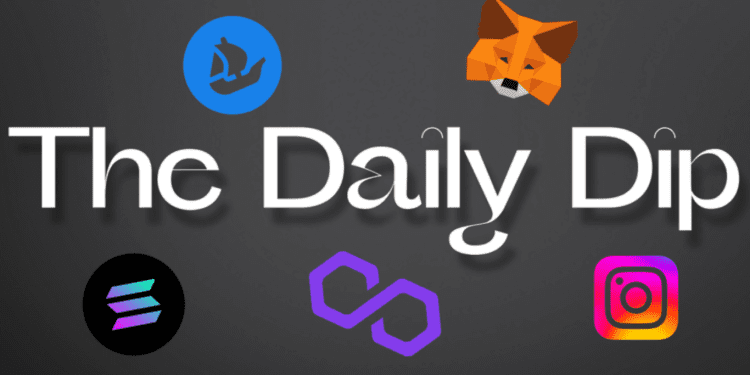Disclaimer: The following publication will review current market sentiment and activity using data from various analytical sources. Points made within this article are my thoughts and opinions and are in no way financial advice.
Today’s Topics
- Instagram Allowing Minting & Selling of NFTs Via Polygon
- Facebook & Instagram Now Supporting Solana
- Metamask Integrating into Web3 Gaming
- OpenSea Launches New Stolen Item and Scam Detection Features
- Other News
Instagram Allowing Minting & Selling of NFTs Via Polygon
Huge news today coming from Meta (Facebook) and Polygon today, as they have announced you can now mint, showcase, and sell Polygon NFTs via Instagram. This is part of Instagram’s new goal of empowering creators, giving them “a new way to engage with and monetize their fan communities.”
Instagram is one of the top social media platforms in the world with 1.4 billion users, and is currently #5 on the Top Charts for free apps on the Apple store. Compared to other social platforms like Twitter, Instagram is one of, if not the leading photo and video sharing platform worldwide. If you put 2 and 2 together, NFTs could thrive on Instagram, given proper infrastructure and a fair chance.
Polygon is an industry leader regarding partnerships and has been the point of entry into the Web3 space for a handful of companies over the last few months. To name a few:
- Starbucks
- Robinhood
- Stripe
- & now Meta
With this news, in addition to JP Morgan using Polygon for their first-ever live DeFi trade just yesterday, it’s safe to say that Polygon is positioning itself as a real contender in the Web3, NFT, and DeFi space.
Facebook & Instagram Now Supporting Solana
In addition to Meta partnering with Polygon, Meta has added support for Solana NFTs on Instagram and Facebook.
Before this update, Instagram supported Coinbase Wallet, Dapper, Metamask, Rainbow, and Trust wallet. Seeing as users will soon be able to connect via Phantom, it’s likely that Meta will continue to add support for more chains down the line. At the moment, Polygon and Solana are the two chains outside Ethereum catching the most attention, which makes sense why they get priority. Unfortunately for CNFT (Cardano NFT) holders, it seems the Cardano ecosystem continues to be neglected, as not even OpenSea has yet to add support for the chain.
Over the last 30 days, The Jpg.store, the OpenSea of CNFTs, has done 49.6 million ADA or $19.3 million in total trading volume over the previous 30 days. When you compare that to the $15 million in total trading volume over the last 30 days for Polygon NFTs on OpenSea, you begin to scratch your head as to why CNFTs arent integrated more into the Web3 ecosystem. Also, remember that the vast majority of Polygon’s NFT volume for October was purely reliant on the Reddit NFT trend from a week or two ago, as the month prior only clocked in $7.2 million in total trading volume for Polygon NFTs. I don’t hold any Polygon or Cardano assets, but it is interesting to think about.
Metamask Integrating into Web3 Gaming
NFT gaming is one of the fasting growing sectors in Web3 as hundreds of millions of dollars are getting thrown at top metaverse/gaming projects. A few examples: Yuga Labs raised $450 million for Otherside in March, and Digidaigaku raised $200 million to build Web3-based MMOs in late August.
With that said, in all these metaverse/gaming projects being built, what is one thing you will need, no matter what? You guess it, an NFT wallet, and Metamask is planning on becoming THE wallet of the Web3 gaming sector as they have partnered with HyperPlay, A web3-native game installer, to “inject MetaMask into every game launched” through the HyperPlay Platform.
What makes this partnership extra special for Metamask is that HyperPlay will act as an aggregator for Web3 native games. Epic Games and GOG.COM, some of the top digital gaming storefronts in the gaming space using this. This will provide Metamask with premium access to games launched through these platforms, further cementing itself as a leader across various crypto sectors.
According to Metamask, there are plans to launch a developer alpha this month and an end-user beta in early February.
OpenSea Launches New Stolen Item and Scam Detection Features
Over the last year in NFTs, 10s, maybe even 100s of millions of dollars have been lost to scams or stolen. However, OpenSea is stepping up to the plate and has launched two new features to help in this matter: Malicious URL Detection and Removal and Theft Detection and Disablement.
Quick points covering how Malicious URL Detection and Removal works:
- Proactively scans URLs shared on OpenSea
- Cross-checks a given URL against a blocklist of known malicious sites
- Analyzes interactions and transactions to identify malicious behaviors like signature farming and wallet-draining
Quick points covering how Theft Detection and Disablement works:
- Detects NFT theft in REAL-TIME and prevents further resales of suspected stolen items to unsuspecting buyers
- Items involved in detected suspicious behavior will be temporarily disabled on OpenSea
- The previous owner will immediately be notified via email, whereas feedback can be received for further action
According to OpenSea, they aren’t stopping here, as they are openly reaching out to other Marketplaces, Wallet providers, and developers to ensure these changes are implemented ecosystem-wide. Great job from the OpenSea team!
Other News
- Bored Apes Otherside Builder: Web3′ Only Plausible Solution’ to Manage Metaverse Economy
- Game of Thrones NFT’s latest effort to tempt fans with crypto collectibles
- FIFA NFTs To Unlock VIP Experiences For World Cup Qatar 2022
- Art Gobblers made a multimillion-dollar splash, and BAYC and CryptoPunks regained their $1B valuations, @Ornella_Hdz reports














